
Fil d'Ariane
- Nouvelles et événements
- Nouvelles
- Content
- La symbiose de l’art et des neurosciences : l’initiative Convergence transporte la passion au-delà des frontières scientifiques
null La symbiose de l’art et des neurosciences : l’initiative Convergence transporte la passion au-delà des frontières scientifiques
Cela nous arrive à tous. Nous nous rendons dans un musée d’art dans un état d’esprit ouvert à la création et mû par une volonté d’acquérir de nouvelles connaissances. Malheureusement, face à une œuvre d’art, bien qu’on fasse tous les efforts, bien qu’on la regarde dans tous les angles, on s’y perd et l’on se trouble. Parfois, même les explications sur l’étiquette ne sont d’aucune aide. Cette confusion peut provenir d’un manque de connaissance sur l’approche artistique et les méthodes choisies par l’artiste pour divulguer son message. C’est un véritable défi pour l’artiste de transmettre ce message à un non expert dans le domaine.
Étonnamment, les stagiaires en neuroscience affrontent les mêmes difficultés lorsqu’ils essaient d’expliquer leurs projets de recherche à des non scientifiques.
« C’est toujours quelque peu frustrant pour moi d’entendre : pourquoi donc passes-tu autant d’années à étudier les mouches? À quoi cela peut-il bien servir? » nous dit Hunter Shaw, un étudiant au doctorat du laboratoire du Dr Yong Rao à l’Institut de recherche du Centre universitaire de santé McGill (IR-CUSM). « Bien que l’on soit convaincu que nos projets de recherche sont importants, c’est très difficile de le faire comprendre. »
Est-ce que l’art pourrait offrir, du moins en partie, une piste de solution? Assurément, les beaux-arts ont le pouvoir de rendre des mécanismes complexes en un simple message percutant. Cependant, pour créer ce message, il faut d’abord bâtir des ponts.
Construire ces ponts entre l’art et la neuroscience est le défi du projet Convergence, une perception des neurosciences. L’initiative, débutée l’été dernier, a été fondée par le Dr Cristian Zaelzer, un associé de recherche du laboratoire du Dr Charles Bourque de l’IR-CUSM, en collaboration avec la Dre Andrée Lessard, gestionnaire du Programme en réparation du cerveau et en neurosciences intégratives (RCNI) de l’IR-CUSM et de l’Institut et l’Hôpital neurologiques de Montréal (le Neuro). « Nous avons rassemblé 16 stagiaires du Programme de RCNI provenant de 12 laboratoires différents avec 28 artistes étudiant au moins 10 disciplines différentes à l’Université Concordia pour créer des œuvres d’art inspirées de projets de recherche, nous dit le Dr Zaelzer. En janvier dernier, un cours a été développé par l’Université Concordia pour les étudiants des beaux-arts participants au projet Convergence. »
Alors que les stagiaires et étudiants des deux côtés possèdent plusieurs qualités en commun telles que la rigueur au travail, la créativité et la persévérance, plusieurs stagiaires en neuroscience se sont engagés dans ce projet afin de développer des habiletés en communication. « Nous espérons ouvrir un dialogue entre la science et les arts, apprendre des uns et des autres et accroître nos compétences en communication pour mieux inspirer nos auditeurs, » résume Andrew Kaplan, un étudiant au doctorat du laboratoire de la Dre Alyson Fournier au Neuro. Les jeunes neuroscientifiques du projet Convergence partagent avec les autres participants un sentiment de responsabilité envers les citoyens afin de leur démontrer pourquoi la recherche fondamentale est si importante pour le développement de notre société.
Les jeunes scientifiques croient également que les artistes peuvent les aider à mieux exprimer leur passion pour la recherche. En effet, la littérature scientifique est marquée par sa rationalité et des éléments techniques pointus qui bien souvent demeurent présentés ainsi en toute forme de communication. Par conséquent et bien malheureusement, les scientifiques sont perçus comme des individus détachés et ennuyeux.
« Lorsque j’étais stagiaire, une étudiante au secondaire est venue faire une visite dans notre laboratoire, et nous a annoncé, à mes collègues et moi, qu’à sa grande surprise, nous étions tous presque normaux à ses yeux, relate la Dre Lessard. Le projet Convergence a pour objectif de ramener la passion au premier plan et montrer à la population que non seulement la recherche scientifique est accessible à tous, mais qu’elle peut également être stimulante. »
De leurs côtés, les artistes de Convergence profitent d’une nouvelle source d’inspiration, tout en absorbant la culture scientifique directement des stagiaires. En novembre et février derniers, ils ont assisté à des conférences publiques sur les neurosciences fondamentales et ont découvert des approches technologiques de pointe grâce à des visites privées des laboratoires à l’Hôpital général de Montréal. Il s’agit là d’une opportunité unique pour eux d’apprendre la méthode scientifique et de développer un esprit critique.
Cette collaboration a laissé place à d’intéressants dialogues :
Kim Glassman (étudiante en histoire de l’art) : Êtes-vous intimidé par l’art contemporain?
Ian Beamish (étudiant en neuroscience du laboratoire du Dr Timothy Kennedy au Neuro) : Plutôt oui!
KG : Hé bien, nous trouvons aussi votre langage spécialisé assez intimidant!
IB : Hé bien, pouvons-nous juste arrêter de nous intimider!
Lors des événements suivants, le public est invité à rejoindre les participants de Convergence afin de dépasser les frontières de l’inconnu.
- Exposition d’art du projet Convergence à la Galerie d’Art Visual Voice à l’Édifice Belgo, 372 rue Sainte-Catherine Ouest, espace 421 : du 22 avril au 20 mai 2017
Vernissage (matériaux de Convergence) : le 22 avril de 15 h à 17 h
Finissage (dynamique de Convergence) : le 20 mai de 15 h à 17 h
- Exposition publique dans le cadre du congrès annuel de l’Association canadienne des neurosciences (ACN) à la Grande Bibliothèque (BAnQ), Berri-UQAM : le 27 mai de 15 h à 16 h 30
Pour en savoir plus sur le projet Convergence et ses activités, veuillez visiter http://www.convergenceinitiative.org/ ou écrire à : info@convergenceinitiative.org
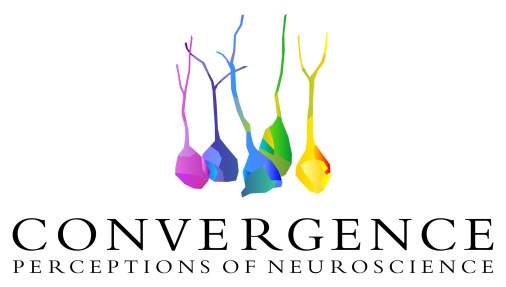 |
||
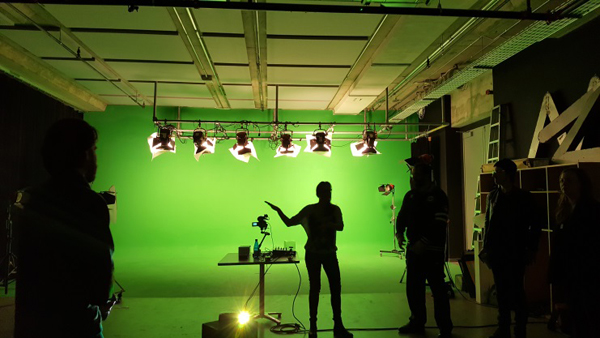 |
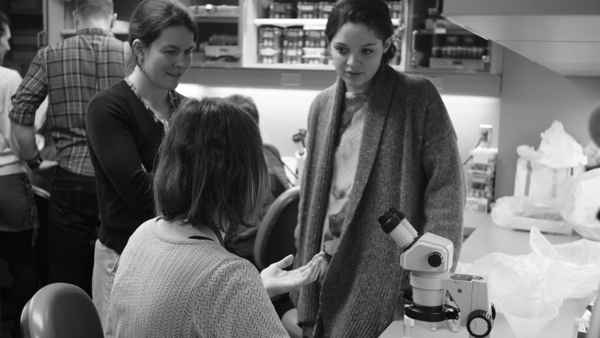 |
|
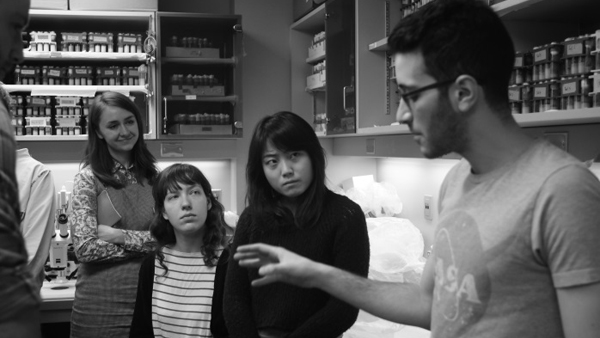 |
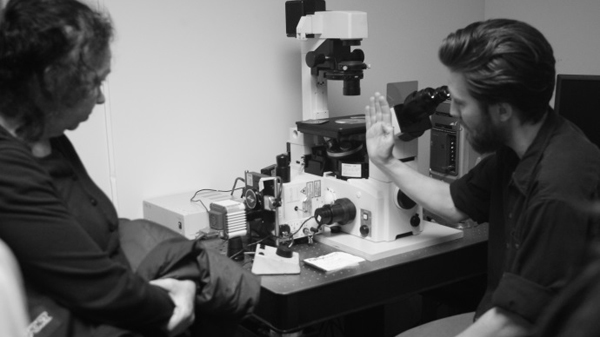 |
|